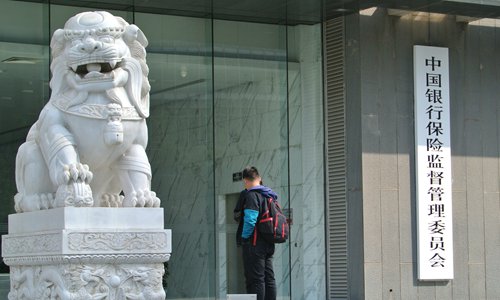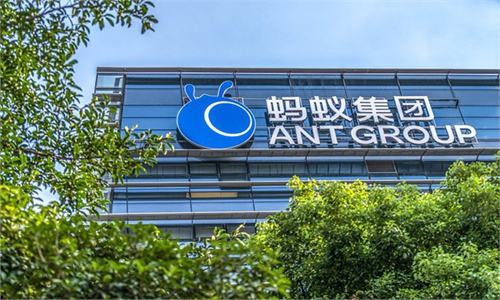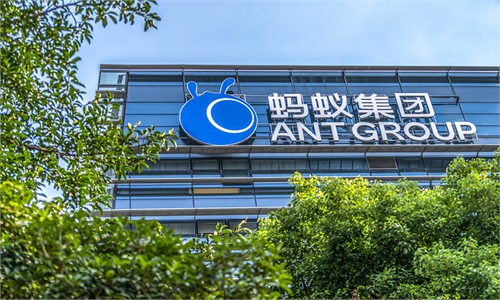
Two people chat outside the headquarters of the China Banking and Insurance Regulatory Commission on April 8. Photo: IC
China's bank regulator has tightened its grip on commercial banks' internet loan business with new rules issued over the weekend that crystallize limits on online loan extension, including a minimum 30-percent funding from the banks' partner institutions in a collaborative loan.The new rules, intended to effectively rein in risks associated with internet loans, won't send many shockwaves through traditional lenders, industry observers said. For internet platforms, especially the likes of Ant Group, regulatory requirements would inevitably eclipse their fund utilization efficiency and could presage even tougher curbs in the pipeline, they believed.
The China Banking and Insurance Regulatory Commission (CBIRC) posted a notice on regulating commercial banks' internet loans on Saturday, a fresh move to implement the central government's requirements concerning development of fintech and the platform economy.
Commercial banks are required to complete their own loan risk evaluations and risk controls, and they are banned from outsourcing key components of risk management, read a statement on the CBIRC's website.
Quantitative indicators are also set for banks' internet loans, including the 30-percent threshold for their partner agencies in a collaborative loan and a 50-percent ceiling on outstanding internet loans jointly extended by banks and their partners as a percentage of the banks' total loan balance.
Further, the banks are prohibited from internet lending in regions beyond their domiciles.
Loan tie-ups between commercial banks and partner institutions improves efficiency, but certain banks have weak credit risk management and unequal sharing of rights, responsibilities and interest with their partners, among other issues, undermining the foundation of the healthy and sustainable development of internet lending, according to a question-and-answer document posted on the CBIRC's website.
The mandatory 30-percent limit was set in accordance with the realities of commercial banks' internet loan services. It also takes into account relevant clauses of the draft rules for online micro-lending, avoiding regulatory arbitrage.
The draft rules, unveiled by the central bank and the banking and insurance regulator in early November 2020, require platform operators to provide a minimum of 30 percent of the funding for loans.
Noticeably, transition periods were laid down for the affected institutions to overhaul their businesses.
The Saturday notice, essentially a regulatory toughening, was envisioned to enable a more effective risk management for internet loans, although it's less likely to have an impact on traditional banks, Lian Ping, head of Zhixin Investment Research Institute, told the Global Times on Sunday.
The size of internet loans is too small compared with total outstanding bank loans to the tune of more than 100 trillion yuan ($15.42 trillion), Lian said, adding that the clients served by online loans are traditionally not favored by banks, which set their eyes on large and medium-sized borrowers with a good track record.
On the part of internet platforms, the new rules would have profound implications, although they're unlikely to kill the online loan services offered by notably Ant Group, JD Digits and Du Xiaoman Financial, the fintech arms of Chinese internet behemoths Alibaba, JD.com and Baidu, analysts said.
The fintech giants, which retain an edge in managing consumer loans and supply chain-related loans within their respective ecosystems, will survive under the new rules, a veteran industry insider told the Global Times on Sunday on condition of anonymity, citing the annualized rate charged for internet borrowing that remains much higher than normal bank loans.
Nevertheless, these giant platforms will have to cope with an inevitable decline in their fund utilization efficiency, the insider said.
Only about 2 percent of Ant's loans are on its own balance sheet, with the rest of the credit balance financed by partner financial institutions or securitized, per the Alibaba fintech offshoot's stock prospectus.
Calls are mounting for the likes of Ant to be compliant in the same way as their traditional bank counterparts so there will be fairer competition in the sphere of online finance. It's often the case that fintech giants, vaguely defined as internet firms, take advantage of their market dominance to spread into the financial arena while not being subject to financial requirements such as bank reserves, the insider disclosed.
"Such a gray area will increasingly be clarified with the new rules and even tougher regulations down the road."
The regulatory toughening also tends to serve as a wake-up call for internet loan-addicted consumers, industry watchers said.
Instead of extending loans on the basis of actual repayment capacity, lending based on consumption records has become commonplace, according to the veteran insider, who said that borrowers are living beyond their means, enabled by readily available internet loans.



